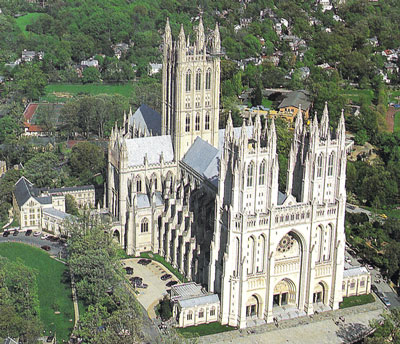Folger Consort's Music for Shakespeare
 Last night, the Folger Consort continued its New Year's tradition by presenting an excellent concert, The Elizabethan Muse, in the glorious space of Washington National Cathedral (the site of President Ford's memorial service a few days earlier). This concert is officially part of the city-wide cultural festival Shakespeare in Washington, in that it featured music by the greatest composers contemporary with the Bard (1564-1616) -- John Dowland (1563-1626) and William Byrd (c. 1540-1623). However, the programming was just as much concerned with the music of the season, the end of Christmastide, continuing themes examined in the Folger Consort's excellent Christmas concert, Greensleeves (reviewed last month).
Last night, the Folger Consort continued its New Year's tradition by presenting an excellent concert, The Elizabethan Muse, in the glorious space of Washington National Cathedral (the site of President Ford's memorial service a few days earlier). This concert is officially part of the city-wide cultural festival Shakespeare in Washington, in that it featured music by the greatest composers contemporary with the Bard (1564-1616) -- John Dowland (1563-1626) and William Byrd (c. 1540-1623). However, the programming was just as much concerned with the music of the season, the end of Christmastide, continuing themes examined in the Folger Consort's excellent Christmas concert, Greensleeves (reviewed last month).
As usual, there were selections for instruments only, with four string players joining the group's artistic directors, violinist Robert Eisenstein and lutenist Christopher Kendall. The best pieces were in the final set, especially an arrangement of a popular tune, Barley break, in a sort of variation set adapted from the work of William Byrd. Eisenstein's meticulous program notes describe Barley Break as "a game, sort of a 16th-century Spin-the-bottle," but if there were words to a tune with that name, they do not survive. The losers of this game ended up "in Hell" together and had to kiss: Robert Herrick did not think the punishment was so bad, in a little poem he wrote about it. Because it was originally a game that took place in a field, it reminds me of a French song, not melodically related to the tune set by Byrd as far as I could tell, Pilons l'orge (Let's beat the barley), which uses the same metaphor for sexual union.
Other secular songs were selected because characters in Shakespeare's plays sing or refer to them. Soprano Jacqueline Horner (of Anonymous 4) sang The Broom, a song mentioned in Two Noble Kinsmen and popular enough still to turn up in John Gay's The Beggar's Opera in the 18th century. Her performance was a little monochromatic by comparison to baritone Gabriel Crouch's rendition of Carman's Whistle, mentioned by Falstaff, which had charming recorder ritornelli interjected by Eisenstein. The loveliest performance in this genre came from the three male singers (Crouch, tenor Philip Cave, and countertenor Steven Rickards) in Ah, Robin, a song by William Cornysh that Shakespeare has Feste sing in Twelfth Night. All of these popular songs are questionable at best as far as being appropriate for performance in the crossing of a cathedral. We must remember, however, that this is the Episcopalian Church, where anything goes, and that does mean anything. Really, if you feel it's right, it's right. (For the irony impaired, I'm only joking.)
The five singers are members of a new group called Accordia, formed by Philip Cave, who now lives in the Washington area. The balance favored the baritone voice too much, especially in the first half, leaving the countertenor almost completely covered. Horner's voice tended to dominate the other soprano, Sally Dunkley. On a few of the unaccompanied choral pieces, their sound gelled the best: the lovely motet O admirabile commercium and the melancholy Holy Innocents anthem Lullaby, My Sweet Little Baby. In the latter piece, Dunkley and Rickards exchanged positions, with good auditory results for some reason. The cross-relation that occurs at the final cadence was deliciously placed. At least some members of the audience must have recognized several of the instrumental pieces as "that music that Sting sang." Several of the Dowland dance pieces were fine, especially Sir Henry Umpton's Funerall and Mrs. Nichol's Almand. Catch this program tonight, if you can.
The Folger consort will repeat The Elizabethan Muse this evening (January 6, 8 pm) at National Cathedral.





















































4 comments:
The cathedral staff is in continual motion.
I saw the Consort's Christmas concert at the Folger and it was incredible. I intend to be at the next one, as well.
could you explain what "monochromatic" means? Inquiring minds need to know :)
Monochromatic: having or appearing to have only one color. The performance in question was of a strophic song, and little varied from stanza to stanza.
Post a Comment